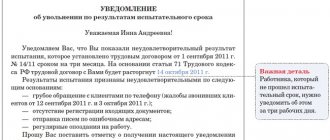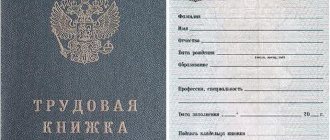Responsibilities of the employer under the Labor Code of the Russian Federation
When hiring a new employee, management is obliged to provide him with a number of guarantees provided for by the Labor Code of the Russian Federation, other regulations and internal documents of the enterprise. In particular, the list of main responsibilities will include:
- drawing up a written employment contract - for this purpose a period not exceeding three days is given from the moment the citizen is hired;
- ensuring conditions of labor protection and safety, including taking into account medical contraindications;
- payment of monetary remuneration in full within the terms provided for by the Labor Code of the Russian Federation and local regulations - at least twice a month;
- compliance with the procedure for bringing to disciplinary liability, including dismissal for guilty actions;
- provision of benefits and guarantees recorded in the Labor Code of the Russian Federation, internal regulations and employment contracts;
- other duties provided for by law or employment contract.
Monitoring the proper performance of these duties is carried out not only by the employee himself. The powers to check applications and complaints of citizens belong to the State Labor Inspectorate, the prosecutor's office, law enforcement agencies and the court.
Examples of labor law: description, features and principles
- Home /
- / State and law Labor law is a branch of law that regulates the relationship between employee and employer. In the case of internal labor regulations, we can talk about the presence of offenses that cause harm to the internal labor regulations.
An elementary example of labor law is the interaction of workers (architect and builder) to jointly obtain the result of work activity. But this is a superficial explanation of the concept. What are its features, principles and where did labor law come from? As the Chairman of the Constitutional Court Sergei Petrovich Mavrin said: “The principle is most important.”It is these principles and examples of labor law that we will consider today. Primary sources Labor law is the youngest branch of law. It appeared at the turn of the 19th-20th centuries.
with the assistance of a prominent scientist of that time L.S. Tal. The Labor Code of the Russian Federation (LC RF) is considered the main source of labor law in Russia.
- Law
The sixth violation, the most controversial, there is no justification for the salary gap
CASE STUDY:
The Moscow City Court recognized the legal establishment of the salary based on the qualifications and other criteria of the employee and did not satisfy the request of the plaintiff, an employee of the organization, to increase the amount of wages (Determination of the Moscow City Court dated January 28, 2014 in case No. 33-5568/2014).
CASE STUDY:
The Yaroslavl Regional Court refused to satisfy the request to change the amount of the employee’s base salary (Determination of the Yaroslavl Regional Court dated March 26, 2012 in case No. 33-1461).
Sanction:
from 30 to 50 thousand rubles (clause 1 of article 5.27 of the Code of Administrative Offenses of the Russian Federation).
If employees working in positions with the same name are given different salary amounts, this in itself is not a violation (Article 129 of the Labor Code of the Russian Federation). Sometimes inspectors oblige the company to pay employees holding the same positions up to the maximum salary for that position. Courts, as a rule, do not agree with such a formal approach, and if there are grounds for establishing different salaries, the actions of the inspectorate are declared illegal.
To remove risks even at the stage of checking the Civil Information System, it is possible to provide different job titles for all employees, for example, through the introduction of grades indicated in the job title. Or establish various allowances, additional payments and other payments (letter of Rostrud dated 04/27/11 No. 1111-6-1).
Responsibility for violation of labor laws table of fines
Violation of labor and labor protection legislation:
2. by an official previously punished for a similar offense
— officials 1000-5000 rubles; - entrepreneurs - 1000-5000 rubles or suspension of activities for up to 90 days; - legal entities - from 30,000-50,000 rubles or suspension of activities for up to 90 days.
2. Disqualification for a period of 1 to 3 years
warning or fine in the amount of 1000-3000 rubles
warning or fine in the amount of 3000-5000 rubles
warning or fine in the amount of 3000-5000 rubles
Violation of safety rules or other labor protection rules:
1
resulting through negligence in causing serious harm to human health. 2
negligently causing the death of a person
2
resulting in the death of a person through negligence. 1
A fine of up to 200,000 rubles or the salary (other income) of the convicted person for a period of up to 18 months, or compulsory labor for a period of up to 480 hours, or correctional labor for a term of up to 2 years, or forced labor for a period of up to 1 year, or imprisonment for a term up to 1 year
1. A fine of up to 200,000 rubles or the salary (other income) of the convicted person for a period of up to 18 months, or compulsory labor for a term of up to 480 hours, or correctional labor for a term of up to 2 years, or forced labor for a term of up to 1 year, or imprisonment for up to 1 year.
2. Forced labor for a term of up to 4 years with deprivation of the right to hold certain positions or engage in certain activities for a term of up to three years or without it, or imprisonment for a term of up to 4 years with deprivation of the right to hold certain positions (engage in certain activities) for a term of up to 3 years, or without it.
Non-payment of wages, pensions, scholarships, benefits and other payments:
1. Not causing serious consequences
a) Partial non-payment of wages, pensions, scholarships, allowances and other payments for more than 3 months, committed out of selfish or other personal interest by the head of the organization, the employer - an individual, the head of a branch, representative office or other separate structural unit of the organization
b) Complete non-payment of wages, pensions, scholarships, allowances and other payments established by law for more than two months, or payment of wages for more than two months in an amount below the minimum wage established by federal law, committed out of selfish or other personal interest by the head of the organization, the employer - an individual, head of a branch, representative office or other separate structural unit of an organization
2. Resulting in grave consequences
1.a) A fine of up to 120,000 rubles or the salary (other income) of the convicted person for a period of up to 1 year, or deprivation of the right to hold certain positions (engage in certain activities) for a period of up to 1 year, or forced labor for a period of up to 2 years of imprisonment for up to 1 year.
1. b) A fine in the amount of 100,000 - 500,000 rubles or the salary (other income) of the convicted person for a period of up to 3 years, or forced labor for a period of up to 3 years with deprivation of the right to hold certain positions or engage in certain activities for a period of up to three years, or without one. imprisonment for a term of up to 3 years with or without deprivation of the right to hold certain positions (engage in certain activities) for a term of up to 3 years.
2. A fine in the amount of 200,000-500,000 rubles, or wages or other income of the convicted person for a period of 1 to 3 years, or imprisonment for a term of 2 to 5 years with deprivation of the right to hold certain positions or engage in certain activities for a period up to 5 years or without it.
snezhana.ru
State supervision of compliance with labor legislation
In accordance with Art. 353 of the Labor Code of the Russian Federation, federal state supervision over compliance with labor legislation and other regulatory legal acts containing labor law norms is carried out by the federal labor inspectorate.
The Federal Labor Inspectorate is a unified centralized system of government bodies that exercise state supervision over compliance with labor legislation on the territory of the Russian Federation.
The main powers of the federal labor inspection bodies are enshrined in Art. 356 Labor Code of the Russian Federation. The powers of the federal labor inspection bodies are established, in particular, by the norms of the Code of Administrative Offenses of the Russian Federation, the Federal Law of December 26, 2008 N 294-FZ “On the protection of the rights of legal entities and individual entrepreneurs during state control (supervision) and municipal control”, the Regulations on federal state supervision for compliance with labor legislation and other regulatory legal acts containing labor law norms, approved by Decree of the Government of the Russian Federation of September 1, 2012 N 875.
In Art. 2 of the said Federal Law N 294-FZ defines the concept of “state control (supervision)”:
State control (supervision) is the activity of authorized government bodies (federal executive bodies and executive bodies of constituent entities of the Russian Federation), aimed at preventing, identifying and suppressing violations by legal entities, their managers and other officials, individual entrepreneurs, their authorized representatives of requirements established by the said Federal Law, other federal laws and other normative legal acts of the Russian Federation, laws and other normative legal acts of the constituent entities of the Russian Federation adopted in accordance with them, through organizing and conducting inspections of legal entities, individual entrepreneurs, taking measures provided for by the legislation of the Russian Federation suppression and (or) elimination of the consequences of identified violations, as well as the activities of the specified authorized government bodies for systematic monitoring of the implementation of mandatory requirements, analysis and forecasting of the state of fulfillment of mandatory requirements when carrying out activities by legal entities and individual entrepreneurs.
Resolution of the Government of the Russian Federation dated September 1, 2012 N 875 approved the Regulations establishing the procedure for federal state supervision of compliance with labor legislation and other regulatory legal acts containing labor law norms. According to the Regulations, federal state supervision in the field of labor is carried out by the federal labor inspectorate, consisting of the Federal Service for Labor and Employment and its territorial bodies (state labor inspectorates), in relation to any employers (legal entities (organizations) regardless of the organizational and legal form and form of ownership , employers - individuals with whom employees have labor relations), as well as other entities that, in accordance with federal laws, are entitled to enter into employment contracts.
Powers of the Federal Labor Inspectorate
The Federal Labor Inspectorate exercises the following main powers:
- carries out state supervision over employers' compliance with labor legislation through inspections, issuing binding orders to eliminate violations, drawing up protocols on administrative violations, and preparing other materials on bringing perpetrators to justice;
- analyzes the circumstances and causes of identified violations, takes measures to eliminate them and restore the violated labor rights of citizens;
- carries out, in accordance with the legislation of the Russian Federation, the consideration of cases of administrative offenses;
- sends relevant information to federal executive authorities, executive authorities of constituent entities of the Russian Federation, local government bodies, law enforcement agencies and the courts;
- checks compliance with the established procedure for investigating and recording industrial accidents;
- analyzes the causes of violations of labor legislation and other regulatory legal acts, prepares proposals for their improvement;
- takes part in the investigation of industrial accidents or conducts it independently;
- requests from federal executive authorities and their territorial bodies, executive authorities of constituent entities of the Russian Federation, local governments, prosecutors, judicial authorities and other organizations and receives from them free of charge the information necessary to perform the tasks assigned to it;
- receives and considers applications, letters, complaints and other requests from employees about violations of their labor rights, takes measures to restore violated rights, etc.
- provides information and consultation to employers and employees on compliance with labor laws;
- informs the public about identified violations of labor legislation, conducts explanatory work about the labor rights of citizens;
- prepares and publishes annual reports on compliance with labor legislation, submits them to the President of the Russian Federation and the Government of the Russian Federation in the prescribed manner; and other powers.
Conducting labor law compliance audits
Inspection is a set of control measures carried out by a state control (supervision) body in relation to a legal entity or individual entrepreneur to assess the compliance of their activities or actions (inaction), the goods they produce and sell (work performed, services provided) with mandatory requirements.
1. Scheduled checks
Scheduled inspections are carried out no more than once every three years based on annual plans. The General Prosecutor's Office of the Russian Federation publishes an annual consolidated plan for conducting scheduled inspections on the official website of the General Prosecutor's Office of the Russian Federation on the Internet until December 31 of the current calendar year.
Scheduled inspections are carried out in the form of 1) documentary and (or) 2) on-site inspection:
- The subject of the documentary check is the information contained in the documents of a legal entity, individual entrepreneur, establishing their organizational and legal form, rights and obligations, documents used in the implementation of their activities and related to their fulfillment of mandatory requirements and requirements established by municipal legal acts, execution of regulations and resolutions of state control (supervision) bodies and municipal control bodies.
- The subject of the on-site inspection is the information contained in the documents of a legal entity, individual entrepreneur, as well as the compliance of their employees, the condition of the territories, buildings, structures, structures, premises, equipment, similar objects, vehicles used by these persons in carrying out their activities, produced and sold by the legal entity , an individual entrepreneur, goods (work performed, services provided) and measures taken by them to comply with mandatory requirements and requirements established by municipal legal acts.
The duration of each inspection cannot exceed 20 working days . The Government of the Russian Federation may establish a shortened inspection period for certain types of state control (supervision) if the activities of a legal entity, individual entrepreneur and (or) the production facilities they use are classified as a certain risk category, a certain class (category) of danger.
In relation to one small business entity, the total period for conducting scheduled on-site inspections cannot exceed 50 hours for a small enterprise and 15 hours for a micro-enterprise per year . According to Art. 4 of the Federal Law of July 24, 2007 N 209-FZ “On the development of small and medium-sized businesses in the Russian Federation” for small enterprises the average number of employees is up to 100 people. Among small enterprises, microenterprises with an average number of employees of up to 15 people are distinguished.
In clause 11.2 of Art. 9 of Federal Law No. 294-FZ establishes that when conducting scheduled inspections checklists may be provided .
Checklists (checklists) are developed and approved by the state control (supervision) body, municipal control body in accordance with the general requirements determined by the Government of the Russian Federation, and include lists of questions, the answers to which clearly indicate compliance or non-compliance by a legal entity, individual the entrepreneur of the mandatory requirements that form the subject of the inspection.
2. Unscheduled inspections
Article 360 of the Labor Code of the Russian Federation provides that the basis for an unscheduled inspection is an employee’s appeal or statement:
- about violation by the employer of his labor rights;
- about facts of violations by employers of the requirements of labor legislation and other regulatory legal acts containing labor law standards, including labor protection requirements, which resulted in a threat of harm to the life and health of workers, as well as leading to non-payment or incomplete payment of wages and other wages on time payments due to employees, or the establishment of wages in an amount less than the amount provided for by labor legislation;
- about facts of evasion from drawing up an employment contract, improper execution of an employment contract or the conclusion of a civil contract that actually regulates the labor relationship between the employee and the employer.
At the same time, consideration of applications, complaints, appeals from citizens about violations of their labor rights, as well as taking response measures aimed at eliminating identified violations and restoring violated rights, is not a right, but a responsibility of labor inspectors.
Rights of State Labor Inspectors during inspections
According to Art. 357 of the Labor Code of the Russian Federation, state labor inspectors, when carrying out supervision, have the right:
- to freely visit at any time of the day, in order to conduct an inspection, organizations of all organizational and legal forms and forms of ownership, employers - individuals;
- request from employers, executive authorities and local governments and receive from them free of charge documents, explanations, information necessary to perform supervisory and control functions;
- remove samples of used or processed materials and substances for analysis, notifying the employer about this and drawing up a corresponding report;
- investigate industrial accidents;
- present mandatory orders to employers to eliminate violations of labor legislation, to restore the violated rights of employees, to bring the perpetrators to disciplinary liability or to remove them from office in the prescribed manner;
- submit to the courts demands for the liquidation of the organization or termination of the activities of their structural divisions due to violation of labor protection requirements;
- issue orders to remove from work persons who have not undergone training in safe methods and techniques for performing work, instructions on labor protection, on-the-job training and testing of knowledge of labor protection requirements in accordance with the established procedure;
- prohibit the use of personal and collective protective equipment for workers if they do not comply with mandatory labor protection requirements;
- act as experts in court on claims for violation of labor legislation and other regulatory legal acts containing labor law norms, for compensation for harm caused to the health of workers at work;
- draw up protocols and consider cases of administrative offenses;
- present to the organization conducting a special assessment of working conditions mandatory instructions to eliminate violations of the requirements of the law on a special assessment of working conditions.
What other bonuses do employees have?
1. The procedural period for going to court has been increased from 3 months to 1 year (Part 2 of Article 392 of the Labor Code of the Russian Federation).
Let us give a case from practice: an employee challenged the dismissal order, recovered money from the employer for the period of forced absence, and then discovered that the employer had committed additional violations of his rights, and, successfully meeting the procedural deadlines, went to court again.
2. The employee will be able to go to court at his place of residence, including if he has moved (clause 6.3. p. 29 of the Code of Civil Procedure of the Russian Federation).
This situation is fraught with additional transportation costs for the organization and expenses for paying for the services of a representative.
Please note that we are talking about a district (city) court. And this means that an employee who moved from
Chelyabinsk, for example, in the city of Salekhard, will be able to file a claim at a new place of residence.
Examples of labor law: description, features and principles
Law September 9, 2020 Labor law is a branch of law governing the relationship between employee and employer.
An elementary example of labor law is the interaction of workers (architect and builder) to jointly obtain the result of work activity. But this is a superficial explanation of the concept.
What are its features, principles and where did labor law come from? As the Chairman of the Constitutional Court Sergei Petrovich Mavrin said: “The principle is most important.” It is these principles and examples of labor law that we will consider today. Labor law is the youngest branch of law.
It appeared at the turn of the 19th-20th centuries.
with the assistance of a prominent scientist of that time L.S.
Tal. The Labor Code of the Russian Federation (LC RF) is considered the main source of labor law in Russia. It was legally certified on December 30, 2001 and was a replacement for the outdated Labor Code of the RSFSR.
Moreover, in addition to exclusively labor relations,
Violations in the registration of labor relations
Regulatory authorities are picky about the formalization of labor relations. This is mainly aimed at combating unregistered workers. Accordingly, the fines for misconduct in the formalization of labor relations are very large.
However, even conscientious employers can be fined for violations in the formalization of labor relations. For what exactly and in what sizes? Find out from the table. 1 and 2.
Table 1. Amount of financial sanctions for violations in the formalization of labor relations
| Type of labor law violation | Violated rule of law | Fine for the employer |
| 1) actual admission of an employee to work without drawing up an employment agreement (contract): | ||
| • failure to draw up an employment contract with the employee, including failure to draw up an employment contract in writing, provided that compliance with the written form of the contract is mandatory(1) | 111690 UAH. (30 minimum wage) | |
| • failure to formalize an order or instruction from the owner or his authorized body regarding employment | 111690 UAH. (30 minimum wage) | |
| • failure to submit to the State Fiscal Service the Notification of hiring an employee in the form given in the appendix to the resolution of the Cabinet of Ministers of Ukraine dated June 17, 2015 No. 413 | 111690 UAH(2) (30 minimum wage) | |
| 2) registration of an employee for part-time work in the event of actual work performed full working time established in the institution | 111690 UAH. (30 minimum wage) | |
| (1) Cases where an employment contract must be concluded in writing are indicated in Part 1 Art. 24 Labor Code . (2) The State Labor Service takes the position: if, when employing an employee, the employer concluded an employment contract with him and issued an order (instruction) on hiring, but did not submit a Notice of hiring the employee, then such a violation by this regulatory body is considered as |
Table 2. Amount of administrative fines for violations in the formalization of labor relations
| Type of violation of labor laws or employment laws | Violated rule of law | Fine for an official persons of the institution |
| Actual admission of an employee to work without drawing up an employment agreement (contract), admission to work of a foreigner or stateless person and persons in respect of whom a decision has been made to prepare documents to resolve the issue of granting refugee status, on the terms of an employment agreement (contract) without permission to use of labor of a foreigner or stateless person | Part 3 art. 24 Labor Code , | From 8500 to 17000 UAH. (from 500 to 1000 nmdg) |
| Repeated commission of the specified violation within a year, for which the person has already been subject to an administrative penalty | From 17,000 to 34,000 UAH. (from 1000 to 2000 nmdg) |
Here we also note that the amount of financial sanctions for violations in the formalization of labor relations is given in paragraph. 2 hours 2 tbsp. 265 Labor Code
.
We emphasize: the fine provided for by this provision is imposed for each employee against whom a violation was committed. But the amounts of administrative fines for violations in the formalization of labor relations are determined in parts 3 and 4 of Art. 41 Code of Administrative Offenses
.
Examples of labor law: description, features and principles
Labor law is a branch of law that regulates the relationship between employee and employer. An elementary example of labor law is the interaction of workers (architect and builder) to jointly obtain the result of work activity.
But this is a superficial explanation of the concept. What are its features, principles and where did labor law come from? As the Chairman of the Constitutional Court Sergei Petrovich Mavrin said: “The principle is most important.” It is these principles and examples of labor law that we will consider today. Labor law is the youngest branch of law.
It appeared at the turn of the 19th-20th centuries. with the assistance of a prominent scientist of that time L.S.
Tal. The main source of labor law in Russia is considered to be Legally certified on December 30, 2001 and was a replacement for the outdated Labor Code of the RSFSR. Moreover, in addition to exclusively labor relations, labor law also corrects social
An example of labor law from people's lives. Labor law. Additional classifications of rules of law
Subjects of labor relations are endowed with basic rights and responsibilities, which are enshrined in Articles 21-22 of the Labor Code of the Russian Federation.
In contrast to related relations, also associated with the implementation of the mental and physical abilities of people, labor relations are characterized by the following specific features: a) the subject of the relationship - the performer of the work - is included in the team of the enterprise (organization) and through personal labor participates in the implementation of tasks facing another subject relationship.
Such inclusion is usually accompanied by the enrollment of the employee on the staff or payroll of the organization (enterprise) for permanent, fixed-term, temporary or seasonal work. To characterize the labor relationship, the fact of the employee’s direct participation in joint labor activity is important; b) the content of labor relations is reduced to the performance by an employee of a certain type of work in accordance with his specialty, qualifications, position within the labor cooperation, and not an individual specific task.
Employers face new fines for violating the labor rights of disabled people
You should know that important changes are coming with the approval of the draft Federal Law “On Amendments to Certain Legislative Acts of the Russian Federation in order to improve the regulation of issues of job quotas for hiring people with disabilities.” The bill provides that employers will be able to fulfill the quota requirement not only by employing disabled people (as is the case now), but also by making compensation payments to a special fund to promote the employment of disabled people. Compensations will be paid for each free workplace within the established quota, and its amount will be approved by the constituent entity of the Russian Federation (but not less than 7,800 rubles per month).
The Ministry of Labor of the Russian Federation has prepared draft amendments to a number of legislative acts of the Russian Federation concerning the issues of quotas for jobs for the employment of people with disabilities. The changes are being introduced to improve the regulation of these issues. The amendments were developed in accordance with the action plan to increase the level of employment of people with disabilities for 2019-2020, approved by the Government of the Russian Federation (Order No. 893-r dated May 10, 2019).
Labor law examples from life. Labor offenses
Responsibility for violation is provided not only in labor legislation, but also in criminal and administrative legislation.
This example shows that for committing an offense that harms internal labor regulations, a person can be brought not only to material or disciplinary liability, but also to other types of liability.
In accordance with Article 192 of the Labor Code of Russia, for committing a disciplinary offense, that is, failure or improper performance by an employee through his fault of the labor duties assigned to him, the employer has the right to apply the following disciplinary sanctions: reprimand, reprimand, dismissal on appropriate grounds.
In this case, general disciplinary liability will apply.
Federal laws, charters and certain categories of employees may provide for other disciplinary sanctions.
How to find out if an employer has fines for foreign workers
After checking the organization, the FMS draws up an act in which it records the results of its conduct; it is called the “Inspection Report”.
The first part of the act is introductory, it indicates the time and date of the event, details and address of the object. The second part of the act is the main one; it describes all the violations, facts and evidence that were identified during the inspection.
The act is created in two copies, one of which is transferred to the company, the second is left in the FMS case file. Next, the case materials are transferred to the company representative against signature.
From it, the employer will fully learn about all the violations identified and what fines the Federal Migration Service has imposed on the legal entity for illegal immigrants.
If an organization decides to challenge the result of the FMS inspection and the fines, then it will be necessary to go to court with this act.
If you found our article about fines for foreign workers useful, please upvote the material:
migrantmedia.ru
Responsibility for violation of labor laws table
The third point determines interest. For example, if wages are not paid on time because the company is in bankruptcy and money is not received into accounts regularly, and there are no other sources for payments, then there is no reason to punish the manager for lateness. Provided that employees still receive the money they are owed as soon as at least some amounts appear in the accounts.
- disciplinary
– employees who violate labor regulations are subject to penalties; - material
- can occur for both an individual and a company if, through his actions, the culprit caused damage to the other party and must compensate for it. In such a situation, the employer may be forced to pay for both damage and lost profits, while the employee will only pay for damage; - administrative
- managers and other officials pay fines for misconduct; - criminal
- threatens managers who have committed the most serious violations of the Labor Code. In addition to fines, they may be prohibited from holding certain positions or conducting certain activities; - civil law
- just like material, it implies compensation for losses, but is regulated not by labor, but by civil law.
Failure to comply with guarantees for soldier workers
If an institution does not provide guarantees and benefits for employees who are involved in military duties, then this also threatens with fines.
Thus, non-compliance with statutory guarantees and benefits for employees who are involved in the performance of duties provided for by the laws of Ukraine No. 2232
,
“On alternative (non-military) service” dated December 12, 1991 No. 1975-XII
,
“On mobilization preparation and mobilization” dated October 21, 1993 No. 3543-XII
, threatens the employer with a fine of 10 minimum wages (in 2020 - 37230 UAH) for each employee in respect of whom a violation was committed (
paragraph 5, part 2, article 265 of the Labor Code
).
For this violation, an administrative fine in the amount of 50 to 100 nmdg (from 850 to 1700 UAH) may be imposed on officials of institutions (organizations, establishments) ( part 7 of article 41 of the Code of Administrative Offenses
).
For the most common guarantees and benefits for employees who perform military duties, violation of which can lead to the above fines, see table. 5.
Table 5. Guarantees and benefits for employees performing military duties
| Recipients of guarantees and benefits | Rule of law | Contents of the guarantee, benefits |
| Workers called up for compulsory military service, military service for conscription of officers, military service for conscription during mobilization, for a special period or accepted for military service under a contract, including by concluding a new contract for military service, during the validity period special period with a period until its end or until the day of actual dismissal | Maintaining their place of work, position and average earnings in the institution or organization in which they worked at the time of conscription | |
| Workers who, during military service, were injured (other health injuries) and are being treated in medical institutions, as well as captured or declared missing, for a period of up to the day following the day of their registration for military service in district (city) military commissariats after their dismissal from military service in the event of their completion of treatment in medical institutions, regardless of the duration of treatment, return from captivity, their appearance after being declared missing or before the day the court declared them dead | Maintaining their place of work, position and average earnings in the institution or organization in which they worked at the time of conscription | |
| Citizens of Ukraine who are undergoing training in military-technical specialties off-the-job (for the entire training period, including travel time) | Maintaining your job, position and average earnings, compensation for expenses (1) for renting housing for the period of study, as well as travel costs | |
| Citizens of Ukraine to perform duties related to military registration, conscription, acceptance into military service, as well as persons sent by military registration and enlistment offices for medical examination and treatment | Dismissal from work for this time while maintaining the place of work, position and average earnings | |
| Persons liable for military service, called up for training, and reservists in the military reserve (for the entire period of training and performing duties of service in the military reserve) | Maintaining your job, position and average earnings(2) | |
| (1) These guarantees and compensation payments are made in favor of citizens by military commissariats, which send citizens to prepare for military service at the expense of the Ministry of Defense of Ukraine, etc. (2) Payment of average earnings to those liable for military service for the entire period of training and to reservists during the performance of their duties in the military reserve is carried out at the expense of the State Budget of Ukraine in the manner established by the Cabinet of Ministers of Ukraine ( Part 13 of Article 29 of Law No. 2232 ). Payment of average earnings to them is carried out by institutions and organizations in which citizens called up for training work, with the following reimbursement of these expenses from funds provided in the state budget ( clause 2 of the Cabinet of Ministers of Ukraine of 23.11.06, No. 1644 ). |
For example
The court considered a situation where an employee performed work for a month, but an employment contract was not concluded with her. The court recognized the relationship as an employment relationship and ordered the employer to compensate the employee for unearned earnings (Decision of the Aleksinsky City Court (Tula Region) dated March 13, 2017, No. 2-134/2017).
The employer is obliged to compensate the employee for lost earnings, as well as additional expenses (for treatment, food, purchase of medicines, etc.) in connection with a work injury or other damage to health (Chapter 59 of the Civil Code of the Russian Federation).
If the employee’s health is damaged or his death occurs in the event of an industrial accident or occupational disease, the employee is compensated for his lost earnings, as well as additional expenses for medical, social and professional rehabilitation or corresponding expenses in connection with the death of the employee (Article 184 of the Labor Code of the Russian Federation, clause 1 Article 1085 of the Civil Code of the Russian Federation).
Thus, in one of the cases under consideration, an industrial accident with an employee occurred as a result of violation by the employer’s officials of the requirements for labor safety and health. In this connection, the obligation to compensate for moral damage, rehabilitation treatment, and purchase of medications rests with the employer (Decision of the Smolensky District Court dated February 3, 2016 No. 2-2170/2015).
Examples of violations of workers’ labor rights and the main ways to protect them
→ → Current article The protection of the labor rights of workers is guaranteed by the Constitution of the Russian Federation.
Article 352 of the Labor Code of the Russian Federation provides the main ways to protect the labor rights of workers. - this is a meeting of representatives of a certain employer and employees, ready to resolve pre-trial labor disputes that arise in the company.
An employee’s labor rights arise after concluding an employment contract with the employer.
An employed person has the right to:
- compensation for damage, if any occurs during the performance of official duties, compensation for moral damage.
- days off once a week, non-working holidays, annual paid leave;
- timely and full salaries;
The labor rights of workers are often violated.
Delay in payment of wages, non-compliance with the norms of the employment contract, failure to provide paid leave, non-payment of sick leave, illegal dismissal - all this is a serious violation of labor rights.








